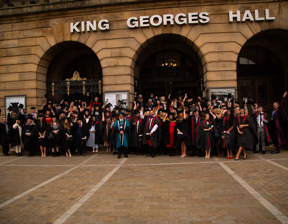Entry Requirements
Completed the Early Childhood Studies Foundation Degree
Study Mode
Full time
Part time
Duration
Full time:
1 year
Part time
2 years
Timetable
Various
Key Features & Benefits
- Validated by UK Top 15 Lancaster University
- Benefit from out long-standing industry connections
- Learn in our state-of-the-art University Centre in The Blackburn Learning Quarter
- Benefit from our industry bespoke facilities, such as the Health Ward and the Sensory Room
This programme provides progression for those who wish to ‘top up’ their Foundation Degree in Early Childhood Studies to a full BA Honours Degree. This programme will allow you to learn in the latest classroom environments, such as, a Sensory Learning Room and Immersive Learning Suite so you can experience the latest digital technologies in your chosen careers.
-
Overview
This programme provides progression for those who wish to ‘top up’ their Foundation Degree in Early Childhood Studies to a full BA Honours Degree in just one-year full time or two years part time. It is delivered over an evening and a one day a week ensuring flexibility to accommodate other commitments. The programme has been designed to account for the ongoing social, cultural and political changes over the years aiming to offer students insights into the complexities, challenges and intricacies of constructs of professionalism, professional identity and multi-professional practice in a diverse work and living context of early childhood. Additionally, the BA Honours Degree has been mapped to the Early Childhood Graduate Practitioner Competencies (ECGPC), produced by the Early Childhood Studies Degree Network (ECSDN) which will allow some students to demonstrate, at this level of study, the skilful application of knowledge to practice, while being assessed in a range of different practice settings and age groups. It is not expected that all graduates will achieve these competencies, rather, it is for those who want to achieve professional recognition and are able to do so with the practice elements that is not required at this level of study.
This programme will allow you to learn in the latest classroom environments, such as, a Sensory Learning Room and Immersive Learning Suite so you can experience the latest digital technologies in your chosen careers.
-
What will I study?
You will complete five modules in order to complete the BA Honours Top-Up Degree, achieving a total of 120 credits. Level 6 modules include five mandatory modules and one optional module out of a choice of three, as indicated below. The optional modules aim to take account of the diverse roles that exist across the ECEC sector, allowing you to become a specialist in a certain area of your choice.
Mandatory Modules:
- Pedagogy and Policy
- Communication and Language
- Developing Professionalism
- Dissertation Planning
- Dissertation Application
Optional Modules, you select one from the list below*:
- Leading and Manging Quality Organisations
- Creativity in Early Childhood
- Educational Approaches
* subject to student numbers/choice
-
Entry Requirements
In order to join the BA Honours Early Childhood Studies (Top-Up) programme you must have successfully completed the FdA Early Childhood Studies Degree with at least a pass mark. We recommend that applicants apply for the ECSDN Graduate Competencies, but this optional and will require independent study to achieve this additional award.
Care Leavers or Young Carers
We want students from all backgrounds to have the opportunity to go to University. If you have spent three months or more in local authority care OR are a young carer, you will be eligible for a contextual offer. This is a grade reduction of 1-A Level grade below our standard entry requirements. For example, a standard offer of CCC, would become CCD. MMM at Level 3 Extended Diploma would become MMP. To apply we advise that you tick the box on your UCAS application which identifies you have spent time in care and to help identify you as eligible for our contextual offer.
-
How will I be assessed?
Assessment will be undertaken through a range of established methodologies at various stages throughout the student learning experience. This incorporates standard practices through formative and summative stages. For some modules there is a choice of assessment allowing you to adopt a strengths-based approach. Feedback for summative assessments is usually given within three weeks following submission. Formative assessments throughout the module allow you to receive important feedback and feedforward as your assessments develop either in written or verbal format. Examples of assessment activity includes:
Summative Assessment:
- Case Study
- Presentation, including video and poster
- Professional Discussion
- Written Critique
- Good Practice Guide
- Report
- Proposal
- Dissertation
- Video Presentation
Formative Assessment
- Recap
- In class discussions and activities
- Peer assessment
- Group assessment
- Seminars
- Journal Club
- Think, pair, share
- Pose, pause, pass questioning technique
- Strategic questioning
- Formal formative feedback through VLE within the modules
-
Teaching and Learning
A movement towards independent learning is required at level 6, where you will be expected to manage and initiative your own learning, building upon prior learning from the Foundation Degree while demonstrating deeper learning, through the synthesis of ideas, debates and concepts. Teaching and learning will be delivered through a range of established methodologies including:
- Audio Visual materials
- Research
- Guest Speaker Events
- Archive and Library searches
- Attendance at conferences
- Presentations at conferences
- Work-based scenarios
- Case studies
- Practical sessions
- Debates
- Traditional interactive lectures
- Strategic and Socratic questioning techniques
- Recap of teaching and learning
- Seminars
- Workshops
- Practical experiences
- One to one support
- Active learning
- Interdisciplinary approaches
- Scaffolding
- Collaborative learning
- Peer teaching, sharing information.
Academic Support
We have a dedicated Academic Coach Team who will be able to provide support in the following areas;
- Study Skills (including reading, note-taking and presentation skills)
- Written English
- Academic Writing (including referencing)
- Research Skills
-
What can I do next?
The vast majority of our graduates go on to work in diverse roles within the ECEC Sector. Recent graduates have gained employment in various full-time and part-time positions often with more responsibility. Career routes for graduates from the programme have included teaching, family support, learning mentors, youth work, children’s nursing, counsellor, educational psychology, speech and language therapy, social work, SEND, Health roles, managerial and leadership roles, amongst many more. Notably some of these professions and roles require students to gain a good degree in BA (Honours) Early Childhood Studies and some may require a conversion qualification to be completed. Progression onto postgraduate study routes could include:
- Early Years Initial Teacher Training (EYITT) is an undergraduate route to achieving Early Years Teacher Status (EYTS)
- Post Graduate Certificate in Early Years with EYTS (0-5 years)
- Post Graduate Certificate in Early Years and Primary Education (3-7 years) QTS
- Post Graduate Certificate in Education FE/HE
- Masters in Social Work, Psychology, leadership and management or other relevant discipline
Postgraduate routes are subject to induvial awards, applications and institutions.
-
Supplementary Information
Supplementary Information
The Programme Specification will give you further information about the course structure, learning outcomes and detailed information about the assessment you can expect during the course.
Work Placements
Work placements are subject to availability. You are also responsible for any costs in travelling to and from your work placements, for any accommodation costs and in some instances the cost of acquiring a satisfactory Disclosure and Barring Service (DBS) report.
-
Fees and Financial information
Going to University is not as expensive as you think. There are no upfront fees to pay if you take out a Tuition Fee Loan from Student Finance England. Don't forget to apply as early as possible to secure your fees before you start your course.

95.8%
Highest in the area for students feeling supported by teaching staff in their learning.














